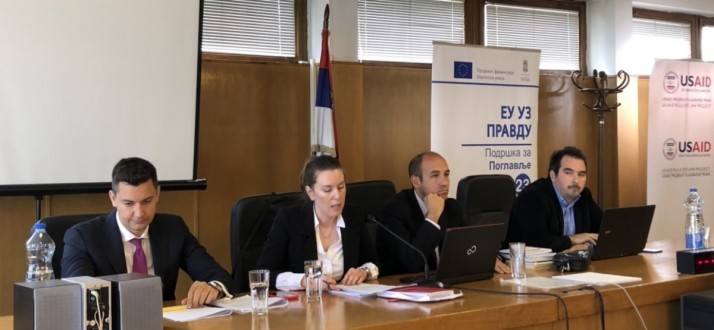“The Amendments to the Enforcement and Security Act (ESA) came as a result of the Ministry of Justice, monitoring the application of the Act, having noticed certain shortcomings which affected the efficiency of the enforcement proceeding as well as an uneven practice of public bailiffs depending on the territory under the jurisdiction of the local high court, i.e. the commercial court before which they appeared”, Assistant Justice Minister Jelena Deretić stated in today’s round table meeting held at the Appellate Court in Novi Sad as part of the public hearing of the Amendments to the ESA, and organised by the Ministry of Justice with the support of the EU for Justice – Support for Chapter 23 Project and the USAID Rule of Law Project.
Presenting the new statutory amendments, Ms Deretić stressed that sale and acquisition of real-estate and moveable property would become fully automatised whereby an electronic platform for public bidding would be introduced. She added that once the Amendments entered into force, the new e-platform would be tested for the first 6 months while another property acquisition system would run in parallel. After the 6-month trial period, the e-platform would become the sole one used.
“The e-platform will be set-up in such a way that public bailiffs and the courts will not know the identity of interested bidders, thus keeping them anonymous. Also, the system will generate a payment of security from the account into which public revenue is paid“, Deretić explained. She added that everyone paying security would receive a unique identification number which they would require to bid in the e-auction, accessed through the Ministry’s website, for which they would first need to register. “The sale and acquisition procedure will be public. The professional and the general public will be able to follow the 6-hour long public bidding in real time“, Deretić stated.
The Assistant Ministar noted that the ESA provisions on the sale and the acquisition of real-estate and moveable property would remain but that the procedure itself would be defined in greater detail in a bylaw, i.e. the Rulebook on Organising and Conducting an Electronic Public Bidding. “The second part of the enforcement proceeding automatisation will include the introduction of an electronic notice board. By entering their personal information on the website of any court of general or special jurisdiction in Serbia, citizens will be able to check whether any decision or order stemming from an enforcement proceeding would be delivered to them“, Ms Deretić explained to all the participants of the round table, and noted that the e-notice board would be set-up as a public register.
Aside Ms Deretić, the proposed Amendments to the ESA were discussed by the University of Belgrade Law Faculty professor Nikola Bodiroga, a judge of the Basic Court in Belgrade Nikola Stošić and a representative of the American Chamber of Commerce Vladimir Vesović.
Following the presentation of the draft Amendments, the round table participants were given the opportunity to comment on the draft, receiving clarification on the practicality of certain proposed provisions from the Working Group members.






